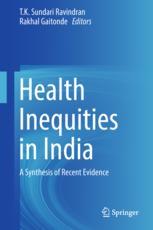Health Inequities in India: A Synthesis of Recent Evidence 2018
دانلود کتاب پزشکی نابرابری های بهداشتی در هند: ترکیبی از شواهد اخیر
| نویسنده |
Rakhal Gaitonde, T.K. Sundari Ravindran |
|---|
| تعداد صفحهها |
239 |
|---|---|
| نوع فایل |
|
| حجم |
3 Mb |
| سال انتشار |
2018 |
89,000 تومان
این کمک به موقع به ادبیات جهانی در مورد نابرابری بهداشتی با گردآوری و تجزیه و تحلیل ادبیات منتشر شده مرتبط در هند به این موضوع می پردازد. در میان کشورهای بریکس، هند از نظر شاخص شکاف جنسیتی کمترین رتبه را دارد و بالاترین نرخ فقر را دارد.شواهد روشنی وجود دارد که نشان می دهد نابرابری های اجتماعی و اقتصادی در هند در قرن بیست و یکم افزایش یافته است. اینها تأثیر مستقیمی بر وضعیت سلامت مردم آن دارد. با این حال، علاقه تحقیقاتی هماهنگ نسبتا کمی در مورد نابرابری های بهداشتی در هند وجود دارد. این جلد شکاف را با گردآوری شواهد تحقیقاتی از سال 2000 در مورد این موضوع پر می کند. این شاید اولین جلد در این زمینه با این گستره و گستردگی باشد. منحصربهفرد بودن آن در گردآوری شواهد در طیفی از محورهای آسیبپذیری در یک جلد نهفته است: وضعیت اجتماعی-اقتصادی، طبقه، جنسیت، و سایر آسیبپذیریهای اجتماعی مانند ناتوانی، وضعیت HIV، و وضعیت مهاجر. و عوامل سیستم بهداشتی که به نابرابری های بهداشتی کمک می کنند یا آنها را کاهش می دهند. هر فصل اصلی نه تنها یافتههای تحقیق را خلاصه میکند، بلکه دیدگاههای منعکسشده در فصلها را نیز بهطور انتقادی به اشتراک میگذارد و چارچوبی برای درک مکانیسمهایی که منجر به نابرابری سلامت میشود، پیشنهاد میکند.
این جلد شکافهای پژوهشی را در روششناسی و محتوا برجسته میکند و به آن میپردازد، و برای محققان و دانشجویان رشتههای بهداشت عمومی و مرتبط با آن، از جمله علوم اجتماعی، و همچنین برای سیاستگذاران و نیز مفید است. اهدا کنندگان
This timely contribution to the global literature on health inequities approaches the subject through a synthesis and analysis of relevant published literature on India. Amongst the BRICS countries, India ranks the lowest in the gender-gap index and has the highest poverty rate, and there is clear evidence that socio-economic inequalities have increased in India in the twenty-first century. These have direct impact on the health conditions of its people; however, there has been relatively little concerted research attention on health inequities in India. This volume fills the gap by synthesizing research evidence since the year 2000 on the topic. This is perhaps the first volume on this topic of such scope and breadth. Its uniqueness lies in the synthesis of evidence across a range of axes of disadvantages within a single volume: socio-economic position, caste, gender, other socially constructed vulnerabilities such as disability, HIV status, migrant status; and health-system factors contributing to or mitigating inequities in health. Each core chapter not only summarizes research findings but also engages critically with the perspectives reflected in the chapters and proposes a framework for understanding the mechanisms through which health inequities result.
This volume highlights and addresses research gaps in both methodology and content, and is valuable to researchers and students of public health and allied health disciplines, including the social sciences, and also to policy makers and donors.




